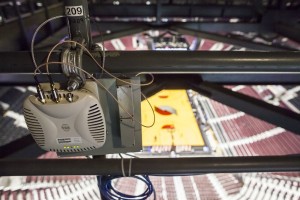After learning of Aruba’s win in Portland we caught up via phone with Manav Khurana, vice president for product marketing at Aruba, to learn more about what Aruba is doing differently in the stadium market. Though the company might have had the inside track in Portland (since it had previously sold gear there for an internal Wi-Fi network) Khurana said the Blazers had treated this year’s stadium technology upgrade as a brand-new project. What helps set Aruba apart from other vendors, Khurana said, are some in-house hardware innovations combined with software management techniques that help overcome the obstacles faced by wireless LANs in crowded spaces.
Focused antennas, optimized connections
To help meet the Moda Center’s design criterium of supplying a wireless network “faster than your home,” Aruba brought in the custom antennas it has designed for use in high-density situations. The Aruba access point antennas, Khurana said, can be focused “like a floodlight,” allowing pinpoint coverage of specific seating areas — and also allowing multiple APs to be positioned closely together without fear of interfering with each other.
On the management side, Aruba has an interesting piece of AP firmware it calls ClientMatch, which Khurana said helps combat the problem of mobile devices “locking on” to a specific access point, even if it’s not the best AP the device might see. “ClientMatch actively monitors all APs [in a network] and if there is a better AP available [for a device] it will move the connection in a real-time basis,” Khurana said. Aruba also uses some internal firewall smarts to help prioritize traffic, a necessary evil especially when video streams are part of the equation, as they are with the new Trail Blazers’ team app.
Advertising and infrastructure partners team up in Portland
One aspect that is unique from a business angle in Portland is the branding of the public Wi-Fi network by the local Toyota dealers, a longtime Blazers advertising partner; in fact, the in-stadium SSID reveals the name “Toyota Free Wi-Fi.” Since Wi-Fi users everywhere are accustomed to seeing a splash screen when they sign in to a new network, Khurana said it should get easier to convince advertisers that Wi-Fi connectivity can provide a new kind of billboard, one with the opportunity for one-on-one engagement.
“Three or 4 years ago it used to be tough [to sell Wi-Fi ads],” Khurana said. “Now everyone sees that screen whenever they log in at the airport. It’s a lot easier now to talk about those kinds of [advertising] opportunities.”
The new network infrastructure in Portland — which will eventually include 400 Aruba APs — was deployed by Crown Castle, and a new team app for this NBA season was developed by YinzCam, which has numerous big-league team app deals in all the U.S. major leagues. Thanks to good local coverage by the Oregonian, we should be able to follow the network’s performance over the NBA season (and see if the locals ever get around to calling the stadium by the new sponsor name instead of the Rose Garden handle by which it has been previously known).







